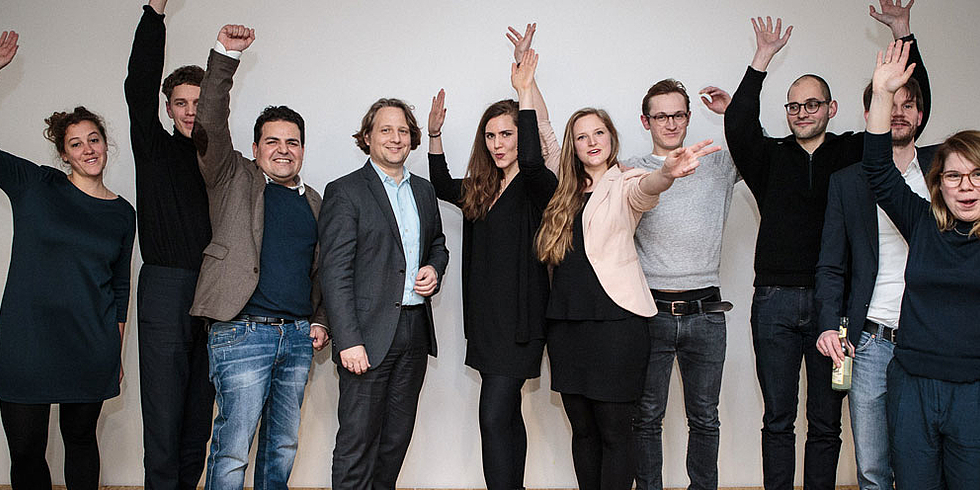Ghost wins Smart Wearables x Smart Textiles Award
The Accelerator Programme initiated by the Senate Administration in cooperation with Atomleap culminated in the Final Demo Day on the 14th of December. On this occasion, the four selected start-up businesses, AiServe, Ghost, Shortcut and Smarterials, pitched their innovative ideas and developed prototypes in front of an audience. The most visionary project was awarded € 10,000 to support their visions to the next level. The jury consisting of Thomas Andrae (Linden Capital), Alexander Kölpin, (WestTech Ventures), Bettine Schmitz (AS Plug & Play), Wolf Jeschonnek (Fab Lab Berlin), Tim Dümichen (KPMG), Olaf Bender (DIN), Tanja Mühlhans (SenWEB) and Stephan Schulze (IBB) declared Ghost the winner of the Smart Wearables/Smart Textiles Award 2017.
The two co-founders of Ghost developed a wearable for patients with artificial limbs and those who have their lost sensation in their arm due to damage to the nerves. The wearable allows the ability to regain tactile and temperature sense.
However, before the prototype development started, the four start-ups were going through the Accelerator Programme started in August 2017. In the course of 14 individual sessions that lasted several days, the innovative business models were further developed until they became market-ready. At the same time, the teams were given the opportunity to meet established companies and to initiate cooperation with them within the scope of supplementary networking events.
The result: four pioneering ideas were produced and developed into prototypes; some start-ups like Shortcut have entered into a cooperation with industry partners like Ottobock. In this context, the objective of Smart Wearables/Smart Textiles innovations was clear – all four ideas are developing pioneering, innovative and visionary solutions for the healthcare industry.
Start-up Profiles
AiServe, Berlin
AiServe is developing smart glasses, allowing visual impaired people to navigate through the city by means of voice control and automatic image recognition.
The team is currently still in the conception phase. The product is intended to include obstacle detection and text recognition.
The team consists of Managing Director Gustavo Madico, who has a longstanding experience from several businesses in China and who has already founded several start-ups. Co-founder Xavi Carceller is in charge of the technological development. Christoph Hanser is responsible for product design and has gained experience at Procter & Gamble, among others.
Ghost, Berlin
Ghost is one of the two teams specializing in the field of prostheses. The two co-founders of Ghost developed a wearable for patients with artificial limbs and those who have their lost sensation in their arm due to damage to the nerves. The wearable allows the ability to regain tactile and temperature sense. This can currently only be achieved through an extensive and costly surgery. The team consists of the two founders Laura Bücheler, who has a background in biomedical engineering, and Isabella Hillmer, who specializes in psychology and industrial design.
Shortcut, Berlin
Shortcut is developing wearables for a better use of computers for patients with hand prostheses. The wearable disables the motoric functions of the prostheses and absorbs slight muscle movements, that are transmitted to a computer interface.
The team consists of three product designers (Maximilian Mahal, David Kaltenbach and Lucas Rex). They received EXIST funding and took part in the Accelerator Programme offered by DesignFarmBerlin (Art School Weißensee).
Smarterials, Berlin
Smarterials is developing Rethought surgical gloves, offering the safety of double gloving and at the same time allowing the same tactile sense of extremely thin surgical gloves. An integrated indictor changes colour in case of possible perforations. Managing Director Dr. Martin Bothe has a PhD in thermomechanical properties of polymers; investment banker Michael Schneiker is in charge of finances and business development; materials engineer Dr. Nikolaus Mirtschin looks after the research and development division; and Chemist Dr. Larisa Schmidt is in charge of material development. The team has recently secured seed financing and is now supported by Think.Health Ventures and Emanet with a six-digit amount.
Contact
Tanja Mühlhans
Leitung Kreativ- und Medienwirtschaft, Digitalwirtschaft, Projekt Zukunft


